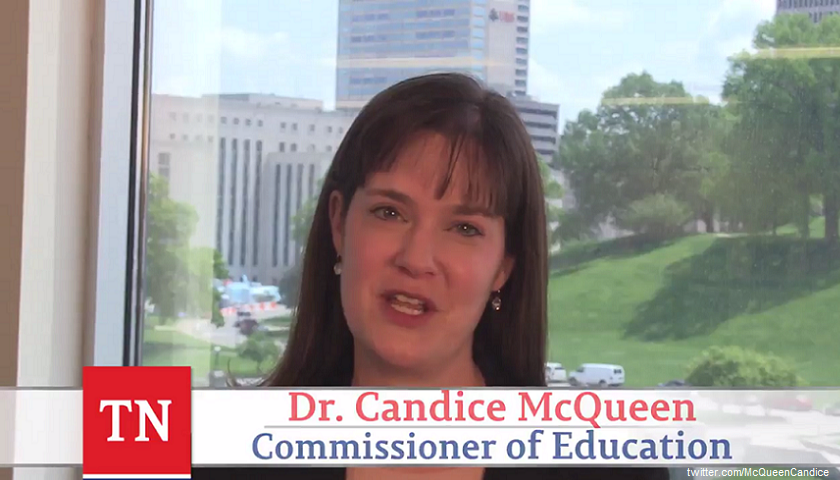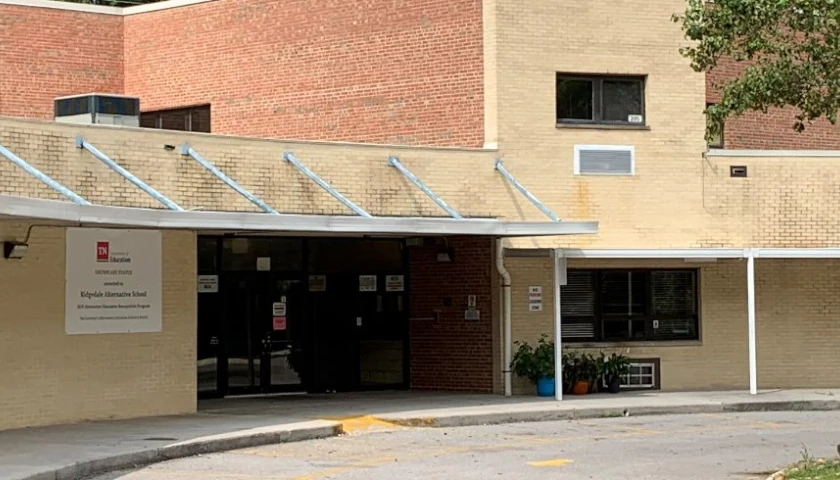On Thursday, the Tennessee Department of Education released the results of the latest round of student testing, which showed that “Tennessee high school students improved across all subject areas – English, math, science, and U.S. history – on the 2016-17 TNReady end-of-course exams.”
“This growth is encouraging, and it shows our students are capable of reaching the high bar we’ve set with our expectations in Tennessee,” Education Commissioner Candice McQueen said:
It’s also promising to see not only overall improvement, but some bright spots in the performance of historically underserved student groups. The results from TNReady shine a light on what’s working and help us to identify where we need to better support students and teachers – so every student in Tennessee reaches his or her fullest potential.
“Assessment will never be popular. However, we share the optimism today of Commissioner McQueen that ‘our students are capable of reaching the high bar we’ve set with our expectations in Tennessee.’ It demonstrates the tremendous efforts our schools and our educators have been making. We have aligned to higher standards and can see that it is now paying off. It has been a tremendous ambitious academic journey for our state,” JC Bowman, the Executive Director of Professional Educators of Tennessee, a non-partisan teacher association headquartered in Nashville, Tennessee, tells The Tennessee Star.
“Overall, scores improved in all subject areas and on nearly every end-of-course exam,” according to the Tennessee Department of Education statement:
In English, students take three end-of-course exams in high school: English I, II, and III. Results on each exam improved this year, and across all three tests, 34.3% of students performed on track or mastered, a jump from 30.4% in 2015-16. Students had the biggest gains in high school English, with more than 11,000 additional students scoring on track or mastered compared to last year.
Across all high school math courses, 21.5% of students performed on track or mastered, up slightly from 20.8% last year. Altogether, over 4,000 additional students scored on track or mastered on high school math in 2017 compared to 2016.
In high school math, districts choose one of two tracks: algebra I, geometry, and algebra II or integrated math I, II, and III. Integrated math combines algebra and geometry throughout the three courses.
On four of the six math exams, the percentage of students who scored on track or mastered improved, and there were slight dips on two tests: algebra II and integrated math II. Notably, the districts participating in these two tests shifted as some districts continue transitioning to integrated math track.
There are two end-of-course exams offered in science: biology and chemistry. Results on both improved. This year, 51.0% of students scored proficient or advanced on the high school science exams – up from 48.9% last year. That means about 4,600 more students were at or above course expectations. . .
In U.S. history, there was also an uptick in the percentage of students who performed on track or mastered – 30.8% in 2017 compared to 29.9% in 2016. That means about 2,800 additional students are now meeting course expectations in U.S. history.
“It is especially encouraging to see that Tennessee high school students improved across all subject areas – English, math, science, and U.S. History. Our educators have worked hard for these results, and it proves teacher quality in Tennessee continues to rise up to meet the challenges. These TNReady results will help identify where we need to better support our teachers and students,” Professional Educators of Tennessee’s Bowman tells The Star:
Professional Educators of Tennessee, as a key strategic partner, and in conjunction with the Tennessee Department of Education, wants to continue to push for smarter, strategic tests in moderation. The transition to online assessments will assist in that effort. In our opinion, it is better to have fewer assessments of higher quality. However, there is no denying the importance of measuring the progress of children in our schools in order to better help them learn.
Our hope is that all Tennessee children receive a world class public education, and our students will be competitive with the academic elite in the world. We want to continue to work to reduce the achievement gap among races so that every student in Tennessee reaches his or her full potential. We are pleased with the performance on TNReady from Tennessee’s historically underserved student groups. In particular, for end-of-course exams in English, all student groups – students with disabilities, English language learners, economically disadvantaged students, and black/Hispanic/Native American students – improved on TNReady. We believe that we still have room to improve, but these are very encouraging results. In addition, the progress shown by students with disabilities is particularly encouraging given that there has been an increase in the number of students with disabilities who participate in TNReady over the past two years.
We often hear from some parents who are concerned about too much testing, as well as from educators who experience pressure to teach to a test. The Tennessee Department of Education has demonstrated a commitment in addressing those concerns to our association. We look forward continuing that dialogue, and moving our state forward for all students, parents and educators.
The 2016-2017 TNReady results compare favorably to the 2015-2016 results.
“In 2015-16, 228,287 high school students took at least one of the End of Course exams, which are the only tests for which there are results due to the suspension of testing in grades 3-8. Students took new TNReady assessments in three subjects: English language arts, math, and social studies,” the Department of Education reported in February 2016:
Generally, on the three English End of Course assessments, 8.3 percent of students are considered as having mastered their End of Course exam, 22 percent are on track, 42.4 percent are approaching, and 27.3 percent are below course expectations. In high school math—which includes the traditional algebra I, algebra II, and geometry courses and the integrated math series—3.7 percent of students are considered mastered, 17.1 percent are on track, 26.2 percent are approaching, and 53 percent are below expectations. On the U.S. history End of Course test, 9.5 percent of students are considered mastered, 20.4 percent are on track, 34.6 percent are approaching, and 35.5 percent are below expectations. Gaps in student achievement widened among different student groups.
In science, the two exams in biology and chemistry were similar to previous End of Course assessments but introduced a time limit. On those assessments, which use the old achievement levels, overall 15.8 percent of students are advanced, 33 percent of students are proficient, 26.8 percent of students score as basic, and 24.4 percent of students are below basic.
“Tennessee enrolls approximately 998,000 students, and is divided into 146 districts with both significant urban and rural populations,” according to the Tennessee Department of Education website.





